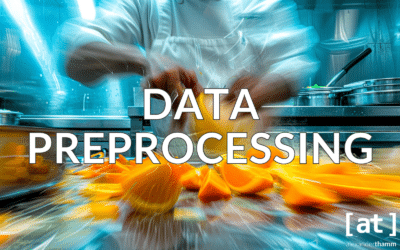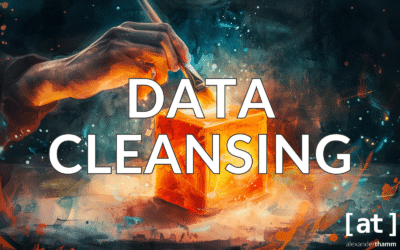The world of data has undergone unprecedented change in recent years, driven by technological progress, changing business requirements and an increasing awareness of the relevance of data. In this dynamic environment, data roles, i.e. the various positions and functions in the field of data management, play a crucial role. The constant change in the market not only influences the content and relevance of these roles, but also shapes their development and requirements. This development is of central importance in order to meet the growing challenges and opportunities offered in dealing with data.
Inhaltsverzeichnis
Data roles in a constantly changing market
At Data Roles are understood as the specific tasks and responsibilitiesthat people in a company have when dealing with data. These roles range from analysing raw data to ensuring data quality and implementing data management strategies. It is crucial for companies to allocate their data roles correctly in order to minimise the risk of errors. Ensure the efficiency and effectiveness of data management.
Data skills refer to the skills and knowledgewhich specialists in data-related positions in companies require. This includes skills such as statistical analysis and programming knowledge, Data visualisation and database management, but also general analytical skills.
The wide range of division of labour in data teams is also reflected in a Large number of specialised data roles reflected. These range from data analysts specialising in the interpretation of Data concentrate on Data Scientistswhich develop complex models, up to Data Engineerswhich are used for the construction of Data architectures are responsible for. Each of these roles requires specific data skills and helps to cover the entire data lifecycle.
The constantly changing market not only increased the Relevance of these rolesbut has also led to a further Differentiation and specialisation of roles led to this. New technologies such as machine learning and big data analytics have contributed to the further development of traditional data roles and the emergence of new roles. This dynamic is also reflected in a plethora of job titles, which are often industry- and company-specific. The aforementioned changes and developments in this area have also led to an increased demand for data experts, whereby a specialisation within the respective data roles can be seen alongside the expansion of the variety of tasks. It can be assumed that this development will continue in the future.
The market for data roles is therefore not only on the move, but is also becoming more complex. Organisations therefore face the challenge of staffing the right data roles with the necessary data skills to meet growing data demands. The ability to adapt to the ever-changing landscape will be critical to the success of data teams and organisations in general.
Are you interested in a career in the data and AI environment or are you looking for a new career perspective? Then apply!
As a fast-growing company, we are constantly looking for employees for our locations in Germany and Austria who are enthusiastic about data and AI, who are familiar with our Values & principles and enjoy working with well-known customers. We look forward to receiving your application.
Data Roles at a glance
Data Analyst
A data analyst is responsible for the Interpretation and analysis of datato support well-founded business decisions. The role of the data analyst has become increasingly important in recent years, as companies are increasingly focussing on data-driven decision-making.
It can be assumed that the Demand for data analysts is expected to increase further as companies recognise the importance of using data effectively. With the advent of new technologies such as machine learning, this role is increasingly involved in the development and implementation of advanced analytics methods. Compared to other data roles, the Data Analyst is mainly focused on interpreting historical data and creating reports.
As Alternative terms for the role of a data analyst can be called Business Intelligence (BI) Analyst, Data Visualisation Specialist or Reporting Analyst.
Business Intelligence (BI) Analysts focus more on using data to improve business strategy and decision-making, often using specialised BI software.
Data Visualisation Specialists specialise in the design and creation of meaningful visual representations of data to make complex concepts easier to understand and use.
Reporting Analysts Finally, the business intelligence tools are designed to produce regular reports that summarise key business metrics and highlight trends to support informed decision-making.
Data skills of a data analyst
- Statistical analysis
- Data visualisation
- Reporting
- Programming skills
- Data mining
- SQL knowledge
Data Scientist
Data Scientists develop complex models and algorithms for companies to gain patterns and insights from large amounts of data. Due to Big Data and the challenge of companies having to deal with large amounts of data, the role of the data scientist has become increasingly important in recent years.
The Demand for data scientists is expected to remain highas companies increasingly rely on predictive analyses and machine learning set. In contrast to the data analyst and other data roles, the data scientist deals with complex modelling techniques and often works with unstructured data.
Other terms for data scientist are, for example, machine learning engineers or predictive modellers.
Machine Learning Engineers In contrast to data scientists, they specialise in the development and implementation of machine learning models to solve specific problems or automate processes.
Predictive modellers focus on creating and refining models that predict future events or outcomes using historical data and statistical techniques.
Both roles complement the comprehensive skills of a data scientist through their specialised focus on machine learning and predictive modelling.
Data skills of a data scientist
- Knowledge of machine learning
- Programming skills
- Big Data Tools
- Knowledge in the field of distributed systems
- Data exploration
- Business acumen

Find out more about the Data Scientist training programme and how to prepare for this sought-after profession.
Data Engineer
Data Engineers are responsible for the Design, maintenance and further development of data architectures and pipelines responsible. The huge increase in data volumes has also made the role of the data engineer more relevant.
It can be assumed that the Demand for data engineers continues to rise The use of mobile phones is becoming increasingly important, as companies are focussing more on the infrastructure required for data collection and processing. Above all, the spread of Cloud technologies and Big Data will continue to shape the role of the data engineer. While a data scientist develops models that can be applied to large amounts of data, the data engineer concentrates on creating the necessary infrastructure for data processing.
Synonyms for the role of a Data Engineer can be Cloud Engineer, Data Architect, Big Data Engineer or Data Infrastructure Engineer, among others.
Cloud Engineers concentrate on the development and maintenance of Cloud-based data infrastructuresThey use cloud services to ensure scalability and flexibility.
Data Architects design the entire data architecture of an organisation, developing structures that support both current and future data requirements.
Big Data Engineers specialise in working with extremely large data sets and use technologies such as Hadoop or Sparkto cope with complex data processing tasks.
After all, the focus is on Data Infrastructure Engineers on building and optimising the physical and virtual infrastructure required to store and process data and ensure that it is robust, secure and efficient.
Each of these roles plays a crucial role in the management and optimisation of a company's data resources.
Data skills of a data engineer
- Data modelling
- Database management
- Data warehousing
- Cloud computing
- Programming skills
- ETL (Extract, Transform, Load) processes

You can find more information about the role of the data engineer and the career opportunities in this profession in our blog post:
Data Steward
Data stewards are responsible for the Data management and quality assurance responsible. Due to the growing importance of Data protection and compliance, the data role of the data steward has also become increasingly relevant.
As companies will continue to face the complex challenges in terms of data protection will have to face, the Role of the data steward even more important will become. Companies will also have to pay more attention to managing their data in accordance with regulatory requirements, which will expand the scope of a data steward's responsibilities. In contrast to other data roles, which concentrate on analysis or infrastructure, data stewards focus their activities on ensuring that data is managed in accordance with regulatory requirements. Data quality and compliance with data protection guidelines.
Alternative role descriptions of a data steward are, for example, Data Quality Manager or Data Custodian.
Data Quality Manager focus specifically on monitoring and improving data quality. Their task is to ensure that the data is accurate, complete and timely in order to support well-founded business decisions.
Data Custodians The data centres, on the other hand, are primarily responsible for the secure storage and protection of data. They implement policies and procedures to Data security and integrity to ensure that data is protected against unauthorised access and misuse.
All three roles contribute significantly to maintaining the integrity and value of an organisation's data resources.
Data skills of a data steward
- Data quality management
- Metadata management
- Data classification
- Data cataloguing
- Data protection knowledge
- Compliance guidelines
Data Governance Manager
The position of Data Governance Manager is essential for the Development and implementation of data guidelines and processes responsible.
Similar to the Data Role of the Data Steward, the Role of the Data Governance Manager with the increase in data protection regulations and compliance requirements increasingly important have become. Companies will continue to be keen to manage their data effectively and ensure that it complies with legal requirements. This is why the demand for data governance managers will remain high. While other roles focus on data analysis, modelling or quality assurance, data governance managers specialise in developing and enforcing data policies to ensure the integrity and security of data.
A Synonymous with the role of a data governance manager is a data compliance officer, for example.
A Data Compliance officer, on the other hand, focuses specifically on compliance with data-related laws and regulations. Their main responsibility is to ensure that all data processing activities within an organisation comply with legal requirements in order to minimise risks such as data misuse or data breaches.
Both roles are essential for maintaining data integrity and trust in an organisation's data practices.
Data skills of a data governance manager
- Compliance management
- Analytical skills
- Process optimisation
- Change management
- Data ethics
- Data leadership

Data governance enables functioning frameworks and standards for the management, access control and use of big data to optimally exploit the potential of data analytics.
Data Governance: Fundamentals, Challenges and Solutions in Data Management
Data Privacy Officer
A Data Privacy Officer is responsible for the Ensuring compliance with data protection regulations and the protection of personal data in companies. This role is only possible with an increasing awareness of Data protection was created.
The Data protection will continue to grow in importance and with it the Increasing demand for data privacy officers. Organisations need to ensure that they comply with data protection regulations in order to maintain the trust of their customers. The role of a Data Privacy Officer differs from other data roles in that it focuses on the protection of personal data and compliance with data protection regulations, whereas other roles are concerned with general data management.
Other designations for Data Privacy Officer can be Privacy Compliance Officers or Data Protection Officers.
Privacy Compliance Officers specialise in ensuring that all data-related activities meet the relevant data protection standards and compliance requirements. They focus on ensuring that organisations act in accordance with laws such as the GDPR (General Data Protection Regulation).
Data Protection Officers On the other hand, they have a broader role that includes not only compliance but also strategic advice on data protection issues. They work closely with various departments to implement data protection best practices and promote awareness of data protection issues.
In all of these roles, data protection and privacy are at the centre of responsibilities.
Data Skills of a Data Privacy Officer
- Data protection laws
- Risk management
- Security measures and encryption technologies
- Data protection audits
- Legal knowledge
- Didactic expertise for the implementation of training courses

Data security and data protection are central functions for securing operational data and value chains. Protect yourself in the best possible way and get comprehensive advice on this topic:
Data security - the most important basics on the topic of data security
Data Product Manager
The role of a Data Product Manager is essential for the Development and marketing of data-based products and services responsible. Due to the growing value of data as a strategic asset, data product managers have become increasingly important.
As companies will continue to rely on data-driven products to gain a competitive edge in the future and the link between technology and business strategy will continue to be of central importance, the Highly relevant role of the Data Product Manager be. Whereas other roles focus on managing data infrastructure or quality, Data Product Managers focus on developing data-based products and services.
Other names for Data Product Manager are Data Offering Manager or Data Solution Manager.
Data Offering Manager focus on defining and developing data-based offerings that are specifically tailored to market needs and customer requirements. They evaluate market trends and customer feedback to create relevant and competitive data products.
Data Solution Manager On the other hand, they deal with the design and implementation of data-driven solutions that solve specific business problems. They work closely with technical teams to ensure that the solutions are efficient, scalable and realisable in practice.
All three roles play a central role in the development and provision of data-based products and services that are both technically innovative and commercially relevant.
Data skills of a Data Product Manager
- Strategic thinking
- Business acumen
- Analytical skills
- Product development
- Project management
- Communication skills
Data roles: changing requirements and perspectives
In the face of constant change, it is clear that key positions in the field of data make a decisive contribution to shaping the digital landscape and the success of companies. The dynamic development of technologies, the increased focus on data protection and compliance and the growing importance of data-driven decisions are constantly presenting data roles with new challenges. At the same time, however, there are also many opportunities for experts in this field. The ability to continuously adapt and intelligently integrate data into business processes will continue to be crucial. In addition to the challenges posed by constant change in the field, there are also opportunities to maximise the innovative power and efficiency of data roles and thus ensure future success.











0 Kommentare